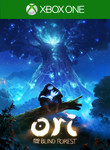Let's get one thing out of the way before we start off - Ori and the Blind Forest is a gorgeous looking platformer. With hand-drawn visuals, fantastic animation, a haunting soundtrack and an equally moving story, this is a game that wowed pretty much the entire Everybody Plays team when it was first shown in trailer form last year, and it's been right at the top of our most wanted lists ever since. Even the game's intro music enough alone is enough to send a shiver down our spine, so it's hard to put into words quite how much we were looking forward to this. Calling a game a breath of fresh air is probably a bit hackneyed, but one of the things that helped Ori stand out so much was the fact it wasn't a grey military shooter. Alongside Fable Legends, it was one of the games that Microsoft seemed to be counting on to help the Xbox One reach out beyond its core dudebro demographic, and into the much larger pool of more casual players - so we were buzzing to pick up the pad.
And it's a game that certainly gets off on the right foot. With an art style that reminds us more of the incredibly stylised Ghibli films than anything Disney-esque, the game's intro focuses on the relationship between Ori and his "mother", the strange gorrila-in-a-mask creature you see above. Raising Ori from a baby, you watch the relationship between the two of them grow, and a bond form - until disaster strikes. Suddenly, the forest starts to die off, and food becomes scarce. With no food to go around, Ori's mom leaves what little remains to keep Ori going, before breathing her last breath, and passing away. It may not sound that upsetting here, but it was enough to move half the Everybody Plays team to tears. Although perhaps not as much as Marley and Me.
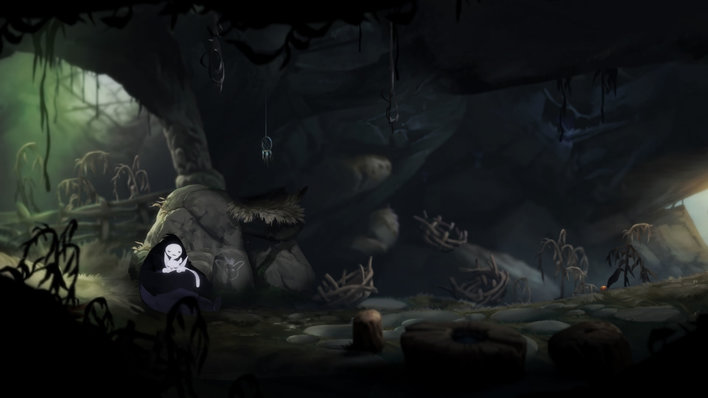
SNIFFFFFFF! : (
After recovering from the depressing introduction (and wiping away your sniffles), you get to take control of young Ori, as he sets about his quest to restore light and life to the forest. A platforming adventure of sorts, rather than being set across specific levels, Ori and the Blind Forest is what's known as a "metroidvania" game, a traditionally helpful games industry term that doesn't actually mean anything to anyone who's never played either of the adjoined games. Essentially what it boils down to is that Ori is set over one big map, with a huge forest to explore as you choose. The twist is, certain parts of the forest will be inaccessible until you've found a new skill, ability or power, with sections blocked off behind spikes you just can't get past, a barrier you can't destroy, or a ledge you can't quite reach. The further you get through the game, and the more abilities you collect, the more of the forest will open up to you - so once you've earnt the double jump, or the ability to hold R to grab onto and climb a vertical wall - you'll have a bit of backtracking to do to find all the secrets and collectibles.

Luckily, Ori can swim. Or else you'd be in big trouble here!
So far, so awesome - but Ori and the Blind Forest isn't all that it seems. Beneath the charming, and enticing exterior lies a game that seems to get a kind of masochistic pleasure out of punishing you, and has been designed, from the ground up, to kill you as many times as it possibly can. Sucking you in with a cute mascot, then ramping the difficulty way up past 11, Ori is a game aimed at the hardcore players, with more than a twinge of "indie tricky" about it.
The enemies here, of which there are many, can mostly kill you in a hit or two. While you can fire back - thanks to your friendly fairy companion, who'll launch herself at anyone who comes within range as soon as you press X - your attacks only ever actually hit enemies when you're all of a few feet away. Spikes in the environment are equally deadly, and mostly somewhat camouflaged thanks to the game's art style, and all you really have to do is brush against them to be sent back to your last save point.
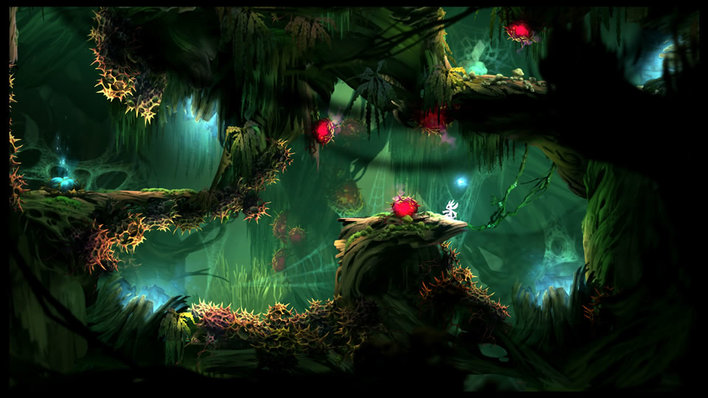
The spikes, and the red things will all kill you. You need to time your jumps perfectly to survive. Good luck.
Oh, and that's another killer issue. The saves in Ori and the Blind Forest aren't exactly as you may expect. Instead of any sort of automatic checkpointing, every save you make must be done manually, by holding B when no enemies are around to create a checkpoint. Again, that on its own wouldn't necessarily be a problem (although it does mean that should you forget to save, you'll find yourself losing a lot of progress when you die) - but the game goes one step further by only letting you have a limited number of saves. A cheap move that only exists to artificially increase the difficulty (as if it needed increasing any further), each "save point" you create uses up a unit of energy from your blue energy bar. The only problem is, your energy bar also gets chewed up by performing a charged attack, or opening certain doors, so you sometimes have to decide between either defending yourself, or being able to save your game for the next few minutes. With death around almost every corner, that's not an easy decision to make. While you can collect power-ups that increase the amount of energy you can store, you'll still find yourself having to save incredibly frequently during some of the more frustrating sections of the game - and all too often, you'll run out of energy, and have to try and complete the trickiest bits in one run, without dying.
And it's not that Ori is completely impossible. If you stick with it, if you persevere, if you practice, practice and practice again, you can, slowly, make your way through the game. It's just that things get frustrating too often. Treading the fine line between being enjoyably tricky and incredibly frustrating, for the most part, Ori has been designed to be one of those games you only ever creep through, taking all of a handful of steps before something kills you, and sends you back to your last checkpoint. Of course, second time round, you'll be anticipating whatever it was, so you'll get that little bit further - until some other unexpected beastie kills you again. So slowly, but surely, you'll manage to crawl your way through the game, sneaking past the difficulty spikes, and learning not to stand in slightly the wrong spot, or get shot by one of the enemies (oh, did we mention the enemies respawn when they go off screen?). It's a game that requires pixel perfect jumping, split second timing, and more fingers than we seem to have, as you try to jump, glide a bit, then double jump at exactly the right second to just grab onto the ledge, and not land on the spikes that are waiting for you. In a way, it reminds us of the infamously annoying platformer N+ (a game which had been designed to kill you as many ways as possible and to be uber hard), or Limbo.
Yet every now and then, for pretty substantial lengths of time, things calm down. The enemies aren't quite so crazy, the game isn't so incredibly challenging, and you start to actually genuinely enjoy yourself, and wonder if things might start to ease off. Hunting around the forest looking for secret passages, revisiting areas you've already explored with to see where your new powers can take you, and searching every hidden part of the beautiful forest is, in a word, fun. Some of the game's puzzles are pretty good too, although again, the lack of any sort of tutorials or help is a big downer. One of the game's later dungeons lets you mess with gravity, thanks to holding an ancient artefact - but again, as is the way with so many things Ori, it took us a lot longer than it really should do to clear it, because we just kept dying trying to figure out what to do.
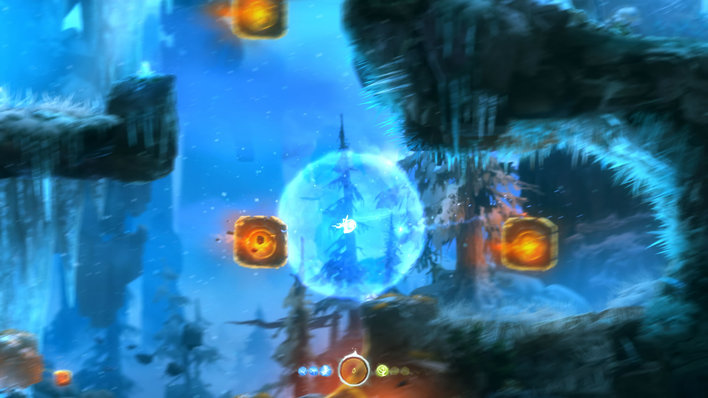
Standing on the block on the left, you need to get to the block at the top of the screen. How? Turns out, if you're holding the artefact (shown by the blue orb), you can just walk around it without dropping off. But nothing actually says this.
Of course, it probably doesn't help that in some sections, the game even prevents from you saving, making the inevitable respawns even more painful. Scattered across the world are three dungeons, that, once you reach the end of them, promptly combust. What follows are "escape" sequences that are amongst the most challenging platforming sections of the game. Having to make use of your leaf to ride the wind up a narrow, spike filled passage, dodging icicles that fall from the roof with split second, pixel perfect precision is the sort of thing you're looking at here - although the game's first dungeon is actually even harder. Making use of Ori's newfound ability to "attack" enemy projectiles, and bounce off them to get an extra boost of air time, the game asks you to leap towards the projectiles, and hold Y at exactly the right moment, which slows down time, and brings up an arrow. All you need do then is rotate the analogue stick so the arrow's pointing in the right direction, and let go to launch yourself into the air. And that's easy enough - but the trick here is, if you miss even one projectile during the entire, lengthy escape sequence, you're screwed. With water rising (and rubber-banding, so even if you make great progress in the first part of your escape, the water magically instantly catches up to you), one mistake is all it takes for the water to catch up with you before you've had time to think, and it's back to the very beginning for you - because you aren't actually allowed to save the game mid-escape. It's a dangerous area, you see.
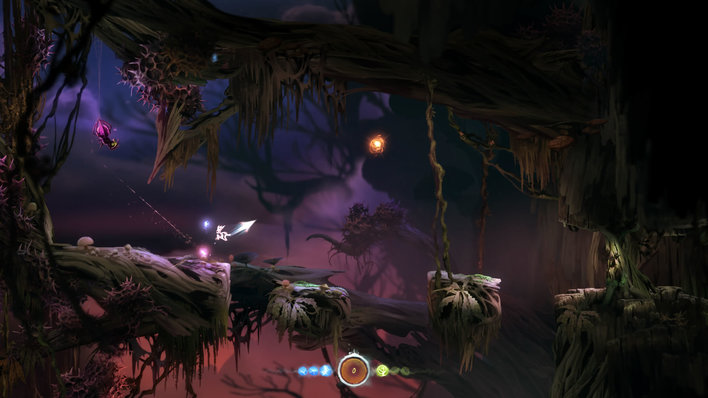
The bounce attack in action. Here, you're going to leap into the air after attacking that purple thing.
And it's this unrelenting, unyielding, unforgiving hardness that's the most frustrating thing. Ori and the Blind Forest had so much potential. It looks like a game you could give to anyone, regardless of whether they'd played a game before or not, and they'd instantly fall in love. They'd just "get it" - and with a game that has that special something, that indefinable appeal seeping out of its every pore, it could have been a doorway into games for millions. It could have sold the Xbox One to those Wii owners who'd grown tired of the Wii U and were longing for some new games to play. It could have been truly special.
But instead, Ori seems to have settled for being a game for the few, hardcore players, and not the many. A game for those who enjoy the punishing difficulty, with no option of turning it down; for those who love the idea of enemies that can kill you in a single hit; traps that are designed to catch you out and send you back to your last (manual) save point. A game that could have been so, so different had it only included an "easy" difficulty, but that the developers seemingly omitted through choice. And it could have been done without really changing anything, level design-wise. Giving Ori more health, a triple jump, automatic savepoints/checkpoints, the ability to summon a ghost character to show you where you're supposed to go next. It could have been so easy, but accessibility wasn't even an afterthought for Ori and the Blind Forest. Like a bar at an amusement park saying "you have to be at least this tall to ride", Ori only wants people who are already experienced gamers to play.
And that's a real shame, because when Ori works, it's still one of the most original, exciting, and involving games you'll have played. But time after time, death after death, and checkpoint after checkpoint, it'll start to wear you down, to the point where you end up wondering whether the good parts (as good as they may be) are really worth the effort you spend getting there.
Ori and the Blind Forest is a game that tells a beautiful story, but it's a game that only a handful of people will be able to see through to its conclusion. And however you look at it, that's really quite sad.
Format Reviewed: Xbox One


